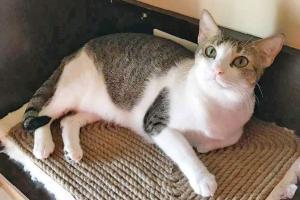The research team stated that whilst there is currently no evidence for cat-to-human transmission, precautions should be considered

This picture has been used for representational purpose only
Chinese researchers have found that cats may be catching the novel coronavirus (Covid-19) at far higher rates than thought before, which could mean they have unique ways of fighting off the virus.
ADVERTISEMENT
Researchers from Huazhong Agricultural University, in the Chinese city, took blood samples from 102 cats. Nasal and anal swabs were also collected.
The study, published in the journal Emerging Microbes & Infections, shows Covid-19 antibodies present in 15 of the blood samples taken from the cats.
Researchers took blood samples from 102 cats. Nasal & anal swabs were also collected. Study shows #Covid antibodies present in 15 of the blood samples taken from cats.Of these, 11 cats had neutralizing antibodies-proteins that bind so successfully to a virus they block infection. pic.twitter.com/O3ET3uxsP0
— IANS Tweets (@ians_india) September 10, 2020
Of these, 11 cats had neutralizing antibodies - proteins that bind so successfully to a virus they block the infection.
None of the cats actually tested positive for Covid-19 or displayed obvious symptoms and, according to the results of return visits, none of these felines have died, the study said.
The sample of cats looked at included 46 abandoned from three animal shelters, 41 from five pet hospitals, and 15 cats were from Covid-19 patient families.
The three cats with the highest levels of antibodies were all owned by patients who had been diagnosed with Covid-19, whilst there were also signs of cats being infected with the virus by other cats from those that were abandoned or based in the pet hospitals.
The research team stated that whilst there is currently no evidence for cat-to-human transmission, precautions should be considered.
"Although the infection in stray cats could not be fully understood, it is reasonable to speculate that these infections are probably due to the contact with SARS-CoV-2 polluted environment, or Covid-19 patients who fed the cats," said study lead author Meilin Jin.
The team assessed the type of antibody reactions in thorough detail and were able to describe the dynamic characteristics of the antibodies found.
Amongst many discoveries within the antibodies, they saw that the type of reaction produced by the cats resembles those observed in seasonal coronavirus infections, implying that the cats who have had SARS-CoV-2 infection "remain at risk of re-infection".
The authors stated that this is a similar transient antibody response to also be observed in humans and that their study should be used going forwards as a "reference for the clinical treatment and prevention of Covid-19".
"We suggest that cats have great potential as an animal model for assessing the characteristic of antibody against SARS-CoV-2 in humans," they added.
Recently, a study published in the journal Nature Communications, revealed that antiviral drug for cats may help fight Covid-19 in humans.
Keep scrolling to read more news
Catch up on all the latest Crime, National, International and Hatke news here. Also download the new mid-day Android and iOS apps to get latest updates.
Mid-Day is now on Telegram. Click here to join our channel (@middayinfomedialtd) and stay updated with the latest news
This story has been sourced from a third party syndicated feed, agencies. Mid-day accepts no responsibility or liability for its dependability, trustworthiness, reliability and data of the text. Mid-day management/mid-day.com reserves the sole right to alter, delete or remove (without notice) the content in its absolute discretion for any reason whatsoever
 Subscribe today by clicking the link and stay updated with the latest news!" Click here!
Subscribe today by clicking the link and stay updated with the latest news!" Click here!






